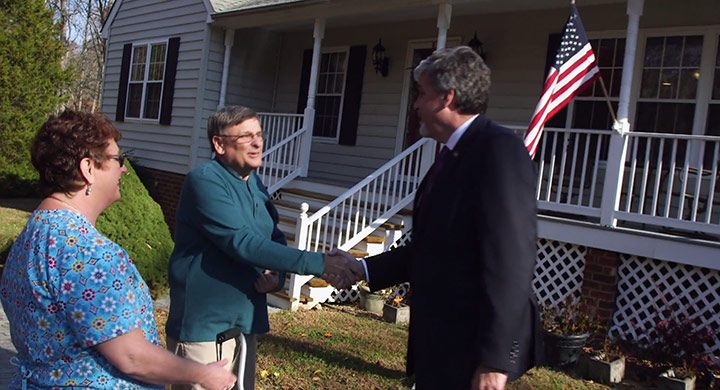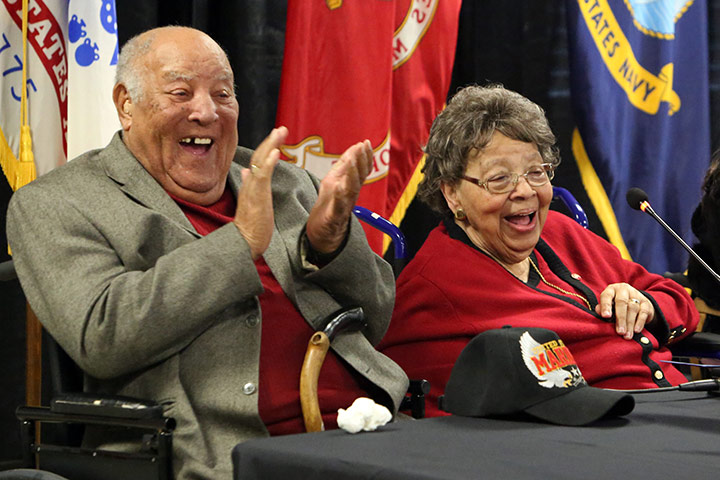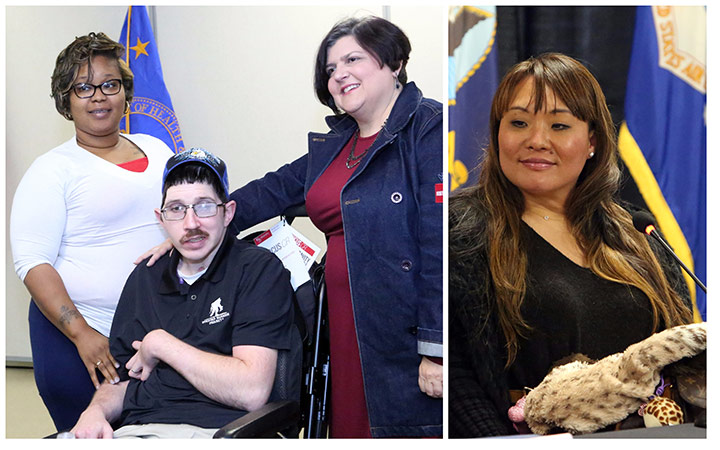
Robert Masse’s service with the U.S. Army in Vietnam earned him a bronze star. After the war, he went on to become a senior non-commissioned officer and drill instructor, helping new recruits learn the basics of Army service.
Like many veterans, Masse experiences both visible and invisible disabilities, and they can affect his life in unexpected ways. For example, as he was putting on a safety vest for a recent boat ride down the James River in Virginia, he suddenly felt like he was back in Vietnam putting on his flack vest.
Having worked with Masse for many years, his caregiver, Carolyn Davis, knew exactly what to say and do to help him through the Post-Traumatic Stress Disorder (PTSD) episode.
According to Masse, the magic words are: "Suck it up, Drill Sergeant."
With Davis’ help, Masse was slowly able to relax and enjoy the rest of the ride.
Masse first met Davis, a certified nursing assistant, while shopping for groceries. At the store, he had dropped something and she picked it up for him. They soon became friends and she accompanied him to a couple of his VA appointments.
She became his caregiver thanks to an innovative program that helps veterans live independently.
The Veteran-Directed Home- and Community-Based Services (VD-HCBS) program allows veterans and their families to use a flexible budget provided by their VA Medical Center to hire family, friends, neighbors, and community providers to deliver the care and services they and their families decide they need. The services can be personal care services, but they also can be unique solutions to their individual challenges. For example, one veteran might hire a neighbor to help with yard work, while another might hire a buddy from the service to help with a fitness program.
The veterans and their families negotiate rates and set their own schedules. A trained counselor from ACL’s aging and disability networks works one-on-one with each veteran to identify options for services and helps them in planning and managing their individual program.
The program is operated in partnership between the Administration for Community Living and the Department of Veterans Affairs (VA).
Last week, federal and state leaders spoke about the program and met with veterans at American Legion Post 175 in Mechanicsville, VA. Before the event, Acting HHS Secretary Eric Hargan visited Masse's home to ask Masse and Davis about their experience with the program.
"Without (Davis), I would not be here," Masse told Hargan, adding that he probably would be a "couch potato."
Masse says Davis has taught him independent living skills and helped him build his self-confidence. She also pushes him to try new things, saying "let's get out of here and do something."
Today, no one could accuse Masse of being a couch potato. He is an active part of his community, including at his church, where he now serves as a lay minister. He also is using his experience with PTSD to help others, recently becoming a certified PTSD peer instructor.
Masse is one of almost 6,700 veterans of all ages who have benefited from the VD-HCBS program since it began in 2008. The program has helped many veterans like Masse stay active in their communities and avoid nursing homes and other facilities. The program also has made it possible for some veterans who had been living in facilities to transition back to the community.
This not only results in higher veteran satisfaction, it also happens to cost less. In fact, one VD-HCBS program found that they could fund VD-HCBS services in the community for three veterans for the cost of nursing home care for one veteran. In addition, participating VAMCs have consistently found that the program reduces hospital admissions and emergency room visits for the veterans who participate in it.
At the event in Mechanicsville, three additional veterans who are receiving services through Bay Aging and the Hunter Holmes McGuire VA Medical Center shared their experiences with the VD-HCBS program.

Burton Hayes was one of the first African-American Marines, serving during World War II. His wife of 70 years, Mildred, said that the VD-HCBS program has allowed them to hire his niece to care for him after a heart attack.
“Burton was determined that he would not be in a nursing home,” Mildred told the crowd. “Being able to be at home means so much to him and to us.”
“You know after being 70 years together, I guess we know each other fairly well,” she added to laughs from the audience.
Lauri Rogers talked about how the program has helped her son David. In 2009, David sustained a severe traumatic brain injury while serving in the Air Force. Before participating in the VD-HCBS program, David's care was provided by a frequently rotating group of care assistants who Lauri says were often inconsistent and unreliable. Through the program, they were able to hire Nadiyah Speight, one of the best assistants they had, to become David's long-term caregiver. Lauri attributes her son’s improvements to Speight’s care and the fact that he can live at home where he’s surrounded by family and neighbors he can interact with.
“It’s just been so much of a freedom for David and for us,” she said. “I’m just so grateful with the change. I love living in this time in history.”
Jill Underriter served in the Army from 2000-2010. After a motorcycle accident in 2009, she became paralyzed with a minor traumatic brain injury. Before participating in the program, she also experienced rotating and inconsistent care. She felt like every time her service dog, Pink, became comfortable around a care worker, the agency would switch them out the next day. Participating in the VD-HCBS program for the last four years, she says, has meant more flexibility and more choices.

The program is now offered by 63 VA Medical Centers in 36 states and territories. It recently was recognized as a "promising practice" by AARP, and the VA has announced plans to expand the program in the coming years.
Masse thinks the program’s approach can help not just veterans, but all older adults and people with disabilities.
"It works and I can see it working in a civilian area as well," he told Hargan. "No problem at all."

